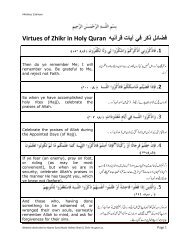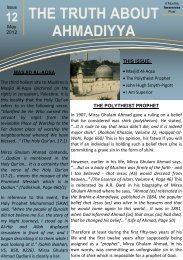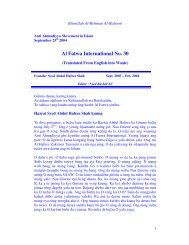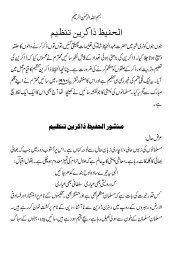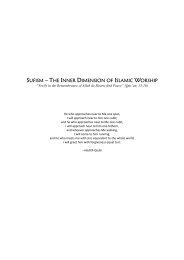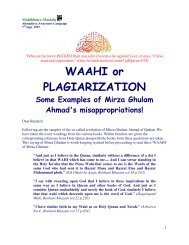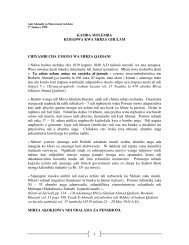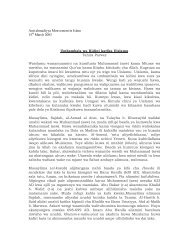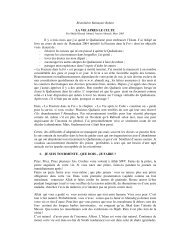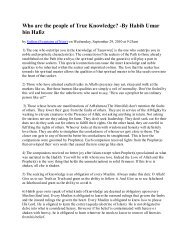Create successful ePaper yourself
Turn your PDF publications into a flip-book with our unique Google optimized e-Paper software.
Page 27 of 130<br />
gauntlet under the banner of Hazrat Khatamun Nabieen Muhammad (SAW). The Qadiani<br />
camouflage and coat will soon be peeled off from every nook and corner of the world,<br />
just as it has been accomplished in Pakistan.<br />
TRAITORS<br />
That day is not far away when the world will get to know of the truth: that the <strong>Qadianis</strong><br />
<strong>are</strong> not Muslims, that they <strong>are</strong> traitors of Islam, traitors of Muhammad (SAW) and traitors<br />
of huma nity. Anti-Qadiani movement is now surging the whole world, sweeping the<br />
<strong>Qadianis</strong> out. Final victory shall be that of our Prophet Mu- hammad (SAW) and his<br />
bondsmen.<br />
BONDSMEN OF PROPHET MUHAMMAD (SAW) IN PAKISTAN<br />
For some time in Pakistan too, people considered the <strong>Qadianis</strong> as Muslims till the<br />
sacrifices, which were offered by the humble adherents of Muhammad (SAW) ended in<br />
success, amputating the growth of Qadiani cancer from the Ummat's body. Allah willing,<br />
this shall happen in other countries of the world also because 'Aalami Majlise Tahaffuze<br />
Khatme Nubuwwat' has launched its operations on an international scale.<br />
The Character of Mirza Ghulam Qadiani<br />
(the founder of the Ahmadiyya Cult)<br />
Mirza Ghulam Qadiani was born in 1839-40 in the county of Qadian, Gordaspur district<br />
in Punjab, India, to a Mughal family. His father's name was Ghulam Murtada and his<br />
mother's name was Charagh Bibi. Mirza's family was in the service of the British<br />
government and represented the British interest to the extent of supporting the British<br />
forces during the Islamic War of Independence.<br />
Mirza received his early education from his father and other teachers of the village and<br />
was given a humble job in the office of the Deputy Commissioner. During his<br />
employment, he participated in and failed promotional exams for better assignments.<br />
Discouraged with his failures, he returned home to take c<strong>are</strong> of the family business. Up to<br />
this period in his life, Mirza Qadiani was an ordinary Muslim; he had the Aqeedah (the<br />
belief) of Muslims and believed in the finality of the Prophet Muhammad (SAW).<br />
At about the same time, British government, wary of anti-British Islamic movements in<br />
India, ordered the creation of an Apostolic Prophet to subdue the spirit of Jihad (striving<br />
against oppressors) in Muslims (British Parliament Report 1870). In 1871, Mirza Ghulam<br />
was elected to the post of Apostolic Prophet.<br />
Between 1882 and 1890, like a confused story-teller trying to get his fable straight, Mirza<br />
made numerous unfounded and conflicting claims; among these <strong>are</strong> his assertions to be a<br />
Mujaddid (a revivalist), Musleh (a reformer), Mehdi (a divinely guided one), and Masih<br />
Mawoud (the Promised Messiah). In the year 1890, he decl<strong>are</strong>d that Jihad and resistance



